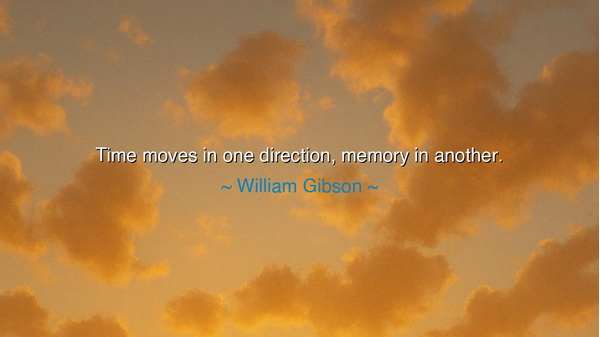
Time moves in one direction, memory in another.






“Time moves in one direction, memory in another.” Thus speaks William Gibson, a prophet of the modern age, whose words echo with the wisdom of the ancients while piercing the heart of our present. In this brief yet eternal sentence he unveils a paradox: while time marches forward, relentless and unstoppable, our memory journeys backward, pulling us into the past, retracing steps that cannot be walked again. Between these two currents—the ever-flowing river of the future and the haunting pull of remembrance—our souls are stretched, caught between what has been and what must yet be.
The origin of this saying is rooted in human experience as old as life itself. From the beginning, men have watched the sun rise and set, knowing it will never return to the same point again. Yet in their hearts, they have carried the shadows and voices of the past. The fields of memory do not follow the clock’s arrow; they unfold according to longing, grief, and joy. A single scent can bring back childhood, a single song can awaken decades gone. Thus, while time thrusts us forward, our memory drags us back into the chambers of what once was.
Consider the story of Odysseus, long journeying home from Troy. The years carried him forward across unknown seas, through storms and trials, yet his memory pulled him always toward Ithaca—toward Penelope, toward the hearth left behind. The march of time took him farther from his home, but memory kept his soul tethered. Without memory, he would have drifted into endless wandering, forgetting his purpose. Without time, he would never have returned. In this tension, his destiny was forged.
So too in our lives, we must learn to honor both forces. Time demands progress, urging us to build, to grow, to act. To resist it is folly, for no man can halt the turning of the heavens. Yet memory demands reflection, urging us to remember who we are, where we come from, and what wounds or joys have shaped us. To abandon it is to lose ourselves, for a man without memory is like a tree without roots. The one points us forward, the other anchors us deep. Together they create the rhythm of human life.
But beware: if one clings too tightly to memory, he may be trapped in shadows, unable to move. Nations too have fallen by dwelling only on their past glories, forgetting that time marches forward and demands renewal. And yet, if one heeds only time, chasing endlessly into the future, he risks becoming hollow, forgetting the lessons and loves that gave his journey meaning. Balance, then, is the path of wisdom: to walk with time while carrying memory in the heart.
A lesson emerges for all who hear: let your memory serve not as a chain, but as a compass. Let your time be spent not in drifting, but in purposeful action. Remember your failures so that they do not repeat; remember your triumphs so that they may give you courage. Yet do not live only in remembrance. Each dawn is new, and time itself offers chances that memory cannot restore. To live well is to hold the past in reverence, while stepping boldly into the stream of tomorrow.
Practical actions follow from this wisdom. Write down the stories of your life, so memory may guide you. Visit the graves of ancestors, so their lessons may endure. But also set goals, rise early, and labor for the works yet to be done. In every day, let there be both remembrance and creation. In every act, let there be both gratitude for what has passed and courage for what is to come.
Thus, carry this truth as a torch: “Time moves in one direction, memory in another.” Do not despair at the divergence, for it is in this very tension that our humanity is found. We are creatures who walk forward while looking back, destined to weave past and future into one tapestry called life.






AAdministratorAdministrator
Welcome, honored guests. Please leave a comment, we will respond soon